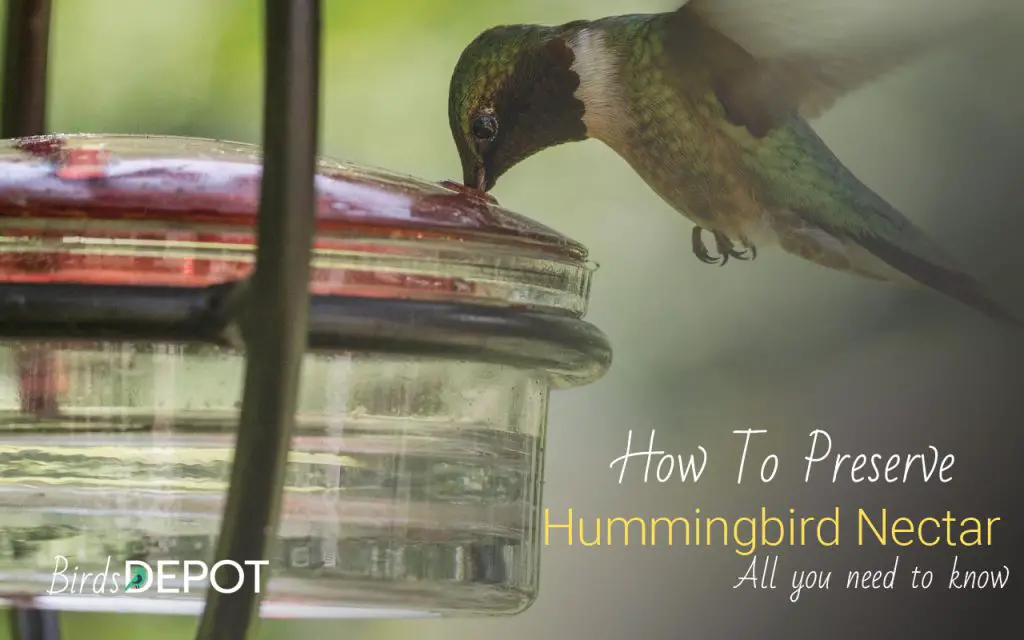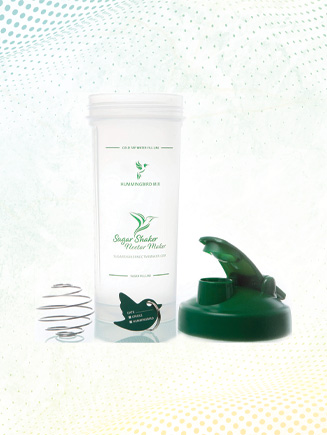Does hummingbird food go bad? How to store hummingbird nectar in the refrigerator?

Hummingbirds are fascinating creatures. If you want to attract more hummingbirds to your garden, it’s crucial to provide them with fresh and nutritious food sources such as homemade nectar. Hummingbird food is an excellent way to attract them to our feeder. Sometimes we want to order bulk nectar or make a large amount of homemade nectar for them, making it necessary to store them for a long time. A refrigerator might be a good idea for storing hummingbird food.
This article will discuss the challenges of keeping hummingbird nectar fresh, how to tell if it’s gone bad, and the dangers of feeding spoiled nectar to these beautiful creatures. We’ll also share valuable tips for storing your nectar properly to keep it fresh longer.
Can you store hummingbird food in the refrigerator?
Yes, you can store hummingbird food in the refrigerator. If you want to save time purchasing hummingbird food, keeping it in the fridge is a good option. Just make sure to choose high-quality nectar to preserve for a more extended period. Refrigeration is an effective way to maintain the freshness and quality of the nectar, as it slows down the growth of harmful bacteria, yeast, and other microorganisms that can spoil it. This method also helps prevent fermentation and preserve the nutritional value of the nectar, ensuring it remains fresh and appealing to hummingbirds.
How long does hummingbird food last in the refrigerator?
Many bird enthusiasts choose to make their nectar using a pre-made powder mix or Pure Cane Sugar, which has an expiration date. However, it is difficult to determine how long the hummingbird nectar will remain fresh once prepared to feed. The shelf life can depend on several factors, including the ingredients used, storage conditions, container cleanliness, and even fridge temperature. The National Zoo & Conservation Biology Institute recommends refrigerating hummingbird food for up to one week. In my experience, the nectar can stay fresh for two to three weeks when properly stored.
However, it is crucial to monitor the condition of nectar before giving it to hummingbirds. Look for signs of spoilage, such as discoloration, cloudiness, unpleasant smell, or changes in texture. If you notice any of these, it’s best to dispose of the nectar and make a fresh batch. Also, wait until the solution fully melts and comes to room temperature before putting it on the hummingbird feeder.
How to store hummingbird food in the refrigerator?
Here is a step-by-step guide to storing hummingbird food in the refrigerator:
- Prepare the hummingbird food: To make hummingbird nectar, follow your chosen recipe, which usually involves dissolving one part of the sugar in four parts of boiled water. It is essential to let the mixture cool completely.
- Clean and sterilize airtight container: Choose a clean container free from residue or contaminants. To ensure cleanliness, thoroughly wash the container with warm, soapy water, rinse it well, and sterilize it by adding boiling water. Remember to allow the container to cool and dry completely before using it.
- Transfer the nectar to the container: Once the container has cooled, be cautious while pouring the prepared hummingbird food into it to avoid any spills or contamination of the nectar.
- Label the container: To keep track of the freshness of your nectar and know when to dispose of it, use a waterproof marker or adhesive label to note the date of preparation on the container.
- Seal the container tightly: Make sure to tightly close the lid or cap to create an airtight seal to prevent any external contaminants from entering.
- Store in the refrigerator: Choose a suitable location for storing the container. It’s best to put it in a cooler area of the fridge, typically near the rear wall, away from foods with strong odors.
- Regularly inspect the nectar: Check it regularly for any signs of spoilage. Keep an eye out for changes in color or consistency, as well as the presence of mold or floating particles.
- Replace as needed: When you store hummingbird food in the refrigerator, it usually stays fresh for 1 to 2 weeks. However, if the nectar is unused or looks spoiled, or you notice an unpleasant odor, it’s best to throw it away and make a new batch.
Sugar Shaker Nectar Maker
Best Hummingbird Nectar Easy Mix Bottle
Here’s a hassle-free way to mix hummingbird and Oriole nectar powder without measuring cups. You can store any extra nectar mix in the fridge for easy refills of your hummingbird feeders.
Does hummingbird food go bad in the refrigerator?
To keep hummingbird food fresh, storing it properly and not keeping it too long is important. Even if refrigerated, the nectar can still spoil due to factors like microorganism growth, exposure to contaminants, and sugar degradation. To prevent spoilage, use a clean container and avoid contact with contaminants during preparation and handling. While refrigeration can slow down bacteria growth, it’s not a guarantee. Consuming or replacing the hummingbird food is recommended for the best taste within 1 to 2 weeks. Follow the above steps carefully.
How to Tell If Hummingbird Nectar Is Bad?
To ensure that hummingbird nectar is safe for consumption, it is vital to check for signs of spoilage. Look for discoloration, cloudiness, or floating particles in the nectar. Smell for any unpleasant or fermented odors, and check for changes in texture such as thickness or sliminess. If any of these signs are present, it’s best to dispose of the nectar and replace it with fresh, uncontaminated nectar.
How often should you change hummingbird food?
Changing the nectar every 3 to 5 days is generally recommended to maintain the freshness and quality of hummingbird food, especially in warmer weather. However, several factors can influence the frequency of changing hummingbird food, including temperature, humidity, and the activity level of hummingbirds in your area. Changing the nectar every 2 to 3 days is advisable in hot and humid climates.
Preserving hummingbird nectar is crucial to ensure these beautiful creatures have a secure and nutritious food supply. If you cannot prepare hummingbird nectar frequently, consider buying or making a large amount of nectar and keeping those in the fridge to keep it fresh. But, only use nectar kept in the refrigerator for a short time.
